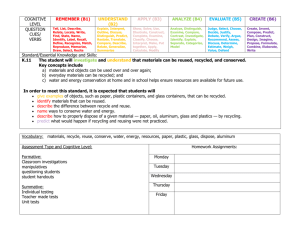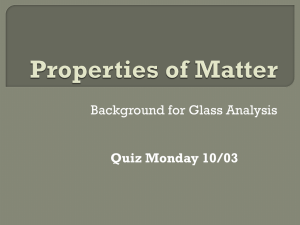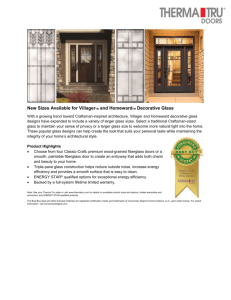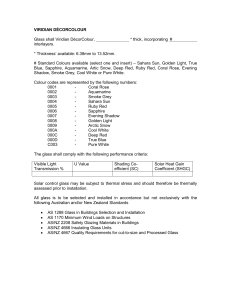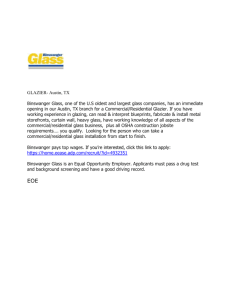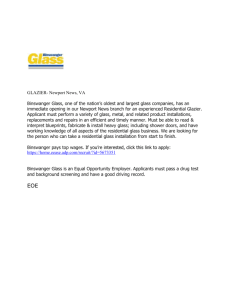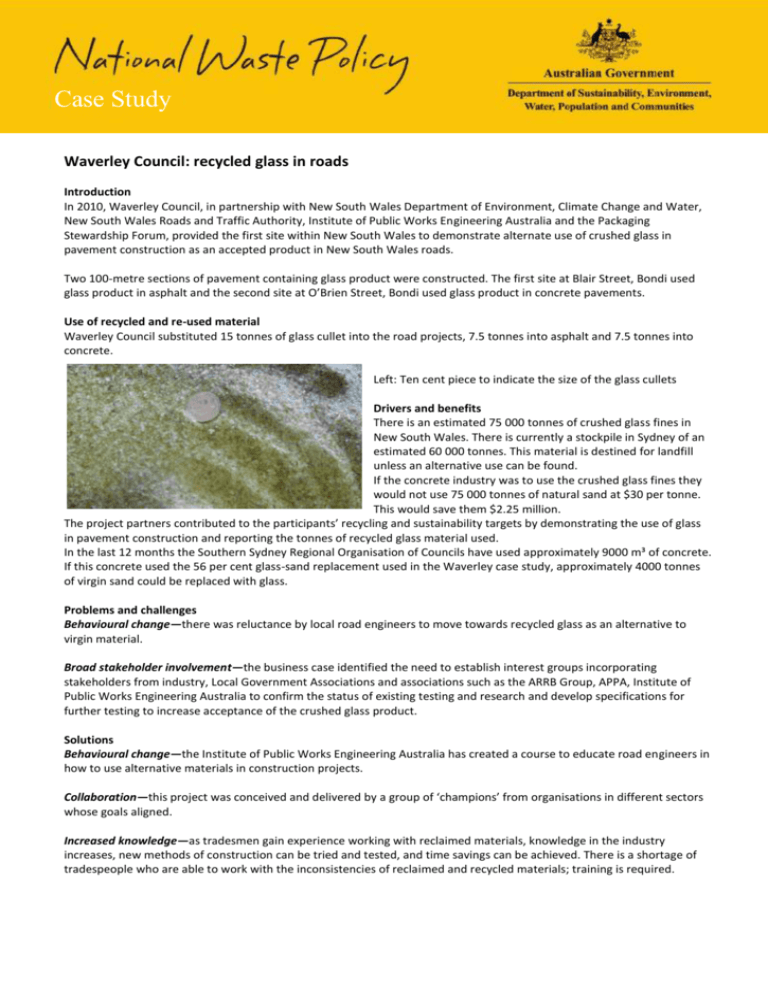
Case Study
Waverley Council: recycled glass in roads
Introduction
In 2010, Waverley Council, in partnership with New South Wales Department of Environment, Climate Change and Water,
New South Wales Roads and Traffic Authority, Institute of Public Works Engineering Australia and the Packaging
Stewardship Forum, provided the first site within New South Wales to demonstrate alternate use of crushed glass in
pavement construction as an accepted product in New South Wales roads.
Two 100-metre sections of pavement containing glass product were constructed. The first site at Blair Street, Bondi used
glass product in asphalt and the second site at O’Brien Street, Bondi used glass product in concrete pavements.
Use of recycled and re-used material
Waverley Council substituted 15 tonnes of glass cullet into the road projects, 7.5 tonnes into asphalt and 7.5 tonnes into
concrete.
Left: Ten cent piece to indicate the size of the glass cullets
Drivers and benefits
There is an estimated 75 000 tonnes of crushed glass fines in
New South Wales. There is currently a stockpile in Sydney of an
estimated 60 000 tonnes. This material is destined for landfill
unless an alternative use can be found.
If the concrete industry was to use the crushed glass fines they
would not use 75 000 tonnes of natural sand at $30 per tonne.
This would save them $2.25 million.
The project partners contributed to the participants’ recycling and sustainability targets by demonstrating the use of glass
in pavement construction and reporting the tonnes of recycled glass material used.
In the last 12 months the Southern Sydney Regional Organisation of Councils have used approximately 9000 m³ of concrete.
If this concrete used the 56 per cent glass-sand replacement used in the Waverley case study, approximately 4000 tonnes
of virgin sand could be replaced with glass.
Problems and challenges
Behavioural change—there was reluctance by local road engineers to move towards recycled glass as an alternative to
virgin material.
Broad stakeholder involvement—the business case identified the need to establish interest groups incorporating
stakeholders from industry, Local Government Associations and associations such as the ARRB Group, APPA, Institute of
Public Works Engineering Australia to confirm the status of existing testing and research and develop specifications for
further testing to increase acceptance of the crushed glass product.
Solutions
Behavioural change—the Institute of Public Works Engineering Australia has created a course to educate road engineers in
how to use alternative materials in construction projects.
Collaboration—this project was conceived and delivered by a group of ‘champions’ from organisations in different sectors
whose goals aligned.
Increased knowledge—as tradesmen gain experience working with reclaimed materials, knowledge in the industry
increases, new methods of construction can be tried and tested, and time savings can be achieved. There is a shortage of
tradespeople who are able to work with the inconsistencies of reclaimed and recycled materials; training is required.
Opportunities for other projects
Before this project there was no general acceptance of crushed glass use in road construction. In August 2008, the
Packaging Stewardship Forum of the Australian Food and Grocery Council commissioned a report by GHD entitled The Use
of Crushed Glass as both an Aggregate Substitute in Road Base and in Asphalt.
The GHD report identified that to gain acceptance for the use of crushed glass in pavement applications it must be
demonstrated that an asphalt or road base mix can meet required properties and performance measures.
The list of opportunities for crushed glass includes:
aggregate in road base and sub-base
aggregate in asphalt, including ‘glassphalt’
aggregate in tiles
aggregate in decorative concrete for architectural facades
alternative to mulch
filtration material
alternative to sand in golf courses
alternative to fill and bedding material
aggregate in concrete and cement
Contacts and links
Waverley Council
www.waverley.nsw.gov.au/
Australian Food and Grocery Council
www.afgc.org.au/
Report: Specifications for Recycled Crushed Glass as an Engineering
Material
http://www.arrb.com.au/Home/News.aspx?newsID=29
Consultation
Mark Wood, Director Public Works and Services, Waverley City Council
Chris Jeffreys, Program Manager, Glass Recovery and Recycling,
Packaging Stewardship Forum, Australian Food and Grocery Council
Peter Richardson, General Manager, Recycling Industries, Alex Fraser
Photos
Waverly City Council
© Commonwealth of Australia 2011
This work is copyright. You may download, display, print and reproduce this
material in unaltered form only (retaining this notice) for your personal, noncommercial use or use within your organisation. Apart from any use as permitted
under the Copyright Act 1968, all other rights are reserved. Requests and enquiries
concerning reproduction and rights should be addressed to Department of
Sustainability, Environment, Water, Populations and Communities, Public Affairs,
GPO Box 787 Canberra ACT 2601 or email public.affairs@environment.gov.au
The views and opinions expressed in this publication are those of the authors and
do not necessarily reflect those of the Australian Government or the Minister for
Sustainability, Environment, Water, Population and Communities.
While reasonable efforts have been made to ensure that the contents of this
publication are factually correct, the Commonwealth does not accept responsibility
for the accuracy or completeness of the contents, and shall not be liable for any loss
or damage that may be occasioned directly or indirectly through the use of, or
reliance on, the contents of this publication.



